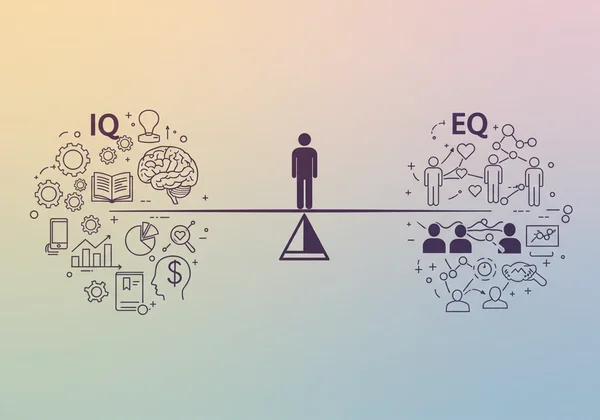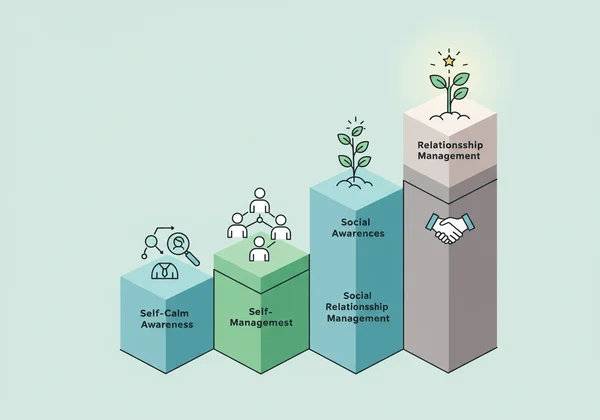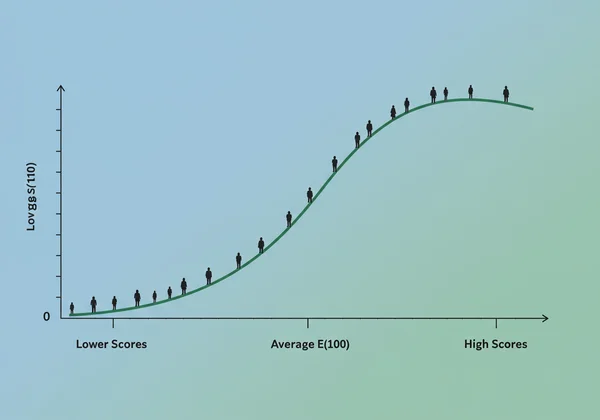What's a Good EQ Score? Interpret Your Emotional Intelligence Test Results
September 2, 2025 | By Phoebe Chandler
So, you’ve just taken an emotional intelligence test. Now you're looking at a number, and a big question is probably on your mind: what's a good EQ score? If you've ever asked yourself, "am I emotionally intelligent?", you're in the right place. That score isn't just a label; it's a launchpad for incredible personal and professional growth. This guide will help you demystify that number, understand what your results truly mean, and turn those powerful insights into action. Ready to begin your journey of self-discovery? Take our free test to get started.
Understanding Your Emotional Intelligence Test Results: Beyond the Number
Before we can define a "good" score, it's essential to understand what's being measured. An EQ score is more than a simple grade; it's a snapshot of your ability to perceive, use, understand, and manage emotions in yourself and others. Think of it less as a final verdict and more as a helpful guide pointing toward your unique strengths and opportunities for development. True emotional intelligence is a dynamic skill set, not a fixed trait.
What is an Emotional Quotient (EQ) and Why Does it Matter?
Your Emotional Quotient (EQ) is a measure of your emotional intelligence. Coined by researchers like Peter Salovey and John Mayer and popularized by psychologist Daniel Goleman, emotional intelligence is widely recognized as a critical factor for success. While IQ (Intelligence Quotient) measures cognitive ability, EQ reflects your capacity to navigate the social world effectively.
High EQ is linked to better leadership, stronger relationships, improved decision-making, and greater resilience in the face of stress. It's the secret ingredient that helps you collaborate on a team, lead with empathy, and manage conflict constructively. In essence, it’s what turns your technical skills into real-world impact.

The Key Components Measured in Your Emotional Intelligence Assessment
A comprehensive emotional intelligence assessment doesn't just give you a single number. It evaluates a blend of key emotional competencies. While models vary, they generally cover these core areas, drawing inspiration from established frameworks like the Mayer-Salovey-Caruso Emotional Intelligence Test (MSCEIT) model:
- Self-Awareness: The ability to recognize and understand your own emotions, moods, and motivations. It's about knowing your strengths and weaknesses and how your feelings affect your thoughts and behavior.
- Self-Management: The capacity to control or redirect disruptive impulses and moods. This includes thinking before acting, managing stress, and maintaining a positive outlook even when things get tough.
- Social Awareness: The skill of sensing and understanding the emotions of others. This is the foundation of empathy and involves recognizing social cues and power dynamics within a group.
- Relationship Management: The ability to build and maintain healthy relationships, communicate clearly, inspire and influence others, and work well in a team.
Understanding these pillars helps you see that your score from any free emotional intelligence test is a profile, not just a point.

What is a Good EQ Score? Interpreting Your Personal Range
Now for the main event: what does a "good" score actually look like? The answer is nuanced. Most scientifically-inspired tests, including our online EQ test, are designed so that scores fall along a bell curve, similar to IQ tests. This means there's a wide range of what's considered "normal."
Average EQ Scores: Benchmarking Against General Trends
On many standardized EQ tests, the average score is set at 100. Scores between 90 and 110 are generally considered to be in the average range, where the majority of the population falls. A score in this range indicates a solid foundation in emotional skills. It means you are likely effective in many social and emotional situations but have clear opportunities to grow.
It's crucial not to get fixated on this number. Context matters. A score that is average for a CEO might be considered high for a recent graduate. The most important benchmark is your own starting point and your desire for personal growth.
High Emotional Intelligence Test Scores: What Strengths Do They Indicate?
Scoring significantly above 110 often suggests a high level of emotional intelligence. Individuals in this range typically exhibit several key strengths. They are often deeply self-aware, resilient under pressure, and highly empathetic. They excel at communication, build strong and trusting relationships with ease, and can inspire and motivate those around them.
These individuals are often seen as natural leaders and are adept at navigating complex social situations. Their ability to manage their own emotions and respond thoughtfully to others makes them effective problem-solvers and trusted colleagues. If you scored high, the next step is learning how to leverage these natural talents for even greater impact.
Lower Scores: Identifying Opportunities for Growth and Development
If your score falls below 90, please do not view it as a failure. Instead, see it for what it is: a valuable and clear roadmap for development. A lower score simply highlights specific areas where you can focus your efforts to see the most significant improvement. It’s an invitation to build skills that will profoundly benefit your life.
For example, a lower result in self-awareness might mean you could benefit from journaling or mindfulness practices. A score indicating a challenge in relationship management could be improved by practicing active listening. Every expert was once a beginner, and your EQ score is simply your starting line. The journey to improve your EQ is one of the most rewarding you can take.

Turning Your EQ Score into Action: Practical Steps for Improvement
Your emotional intelligence test results are the "what." Now, let's focus on the "how." The real value of an EQ test lies in its ability to empower you with actionable insights. Growth is not only possible; it's achievable with focused effort.
Leveraging Your Strengths for Greater Impact
Start with your strengths. If your report shows high social awareness, actively seek roles that involve team collaboration or client relations. If you excel at self-management, take the lead on high-pressure projects where a calm head is needed. By consciously applying your strengths, you reinforce them and build a reputation for being emotionally adept.
Focused Strategies for Developing Weaker EQ Components
Where your report identifies growth opportunities, get specific. Here are a few simple strategies to start building your emotional skills:
- To Boost Self-Awareness: Practice the "pause." Before reacting to a stressful email or comment, take a deep breath and ask yourself, "What am I feeling right now, and why?"
- To Improve Self-Management: When you feel overwhelmed, try the 4-7-8 breathing technique: inhale for 4 seconds, hold for 7, and exhale for 8. It’s a simple trick to calm your nervous system.
- To Develop Social Awareness: In your next conversation, make it a goal to listen more than you speak. Ask open-ended questions and focus on understanding the other person’s perspective without judgment.
- To Enhance Relationship Management: Acknowledge the contributions of others. A simple, specific "thank you" can go a long way in building rapport and trust.
Unlock Deeper Insights with Our AI-Powered Report
A basic score is a great starting point, but true transformation comes from personalized guidance. Our free assessment provides you with your initial score and a brief overview. For those serious about growth, we offer an optional AI-powered report that provides a deep, personalized analysis.
This advanced report goes beyond the numbers to explain why you answered the way you did, connecting your responses to your unique personality and background. It delivers a tailored action plan with specific strategies designed just for you. If you're ready to turn insight into lasting change, unlock your report and get your custom roadmap to a higher EQ.

Your EQ Journey: A Compass for Continuous Growth
Ultimately, the true value of your EQ score emerges when you embrace it as a dynamic tool for personal growth. It’s not a static label but a dynamic compass that can guide you toward greater self-awareness, stronger relationships, and a more fulfilling career. Your emotional intelligence is not fixed; it is a set of skills you can develop throughout your life.
Whether your score was high, low, or somewhere in the middle, the journey is just beginning. Use this knowledge to build on your strengths and embrace your opportunities for development. Start your assessment today to discover your unique emotional profile and take the first step toward unlocking your full potential.
Frequently Asked Questions About Your EQ Score & Emotional Intelligence Tests
What is considered a good score on an emotional intelligence test?
While scores can vary between different tests, a score between 90 and 110 is typically considered the average range on tests benchmarked to a norm group. Scores above 110 are often seen as high, indicating strong emotional skills. However, the most "good" score is one that provides you with actionable insights for your personal development journey.
How can I improve my emotional intelligence after seeing my results?
Improvement comes from targeted practice. Start by focusing on the core components: practice mindfulness for self-awareness, develop stress-management techniques for self-regulation, practice active listening for empathy, and work on clear communication for relationship management. For a tailored plan, consider the personalized strategies offered in our advanced AI-driven reports.
Is an emotional intelligence test a definitive psychological diagnosis?
No, absolutely not. The emotional intelligence tests found on our site and similar platforms are educational tools designed for self-reflection and personal growth. They are not clinical diagnostic tools and should not be used to diagnose any psychological or health conditions. They are meant to be a supportive resource on your journey to self-improvement.
How long does it usually take to complete an emotional intelligence test?
Our emotional intelligence test is designed to be quick and accessible. It consists of 20 carefully crafted questions and typically takes only 5-10 minutes to complete. This allows you to get valuable insights quickly, so you can spend more time acting on your results. You can discover your results in just a few minutes.